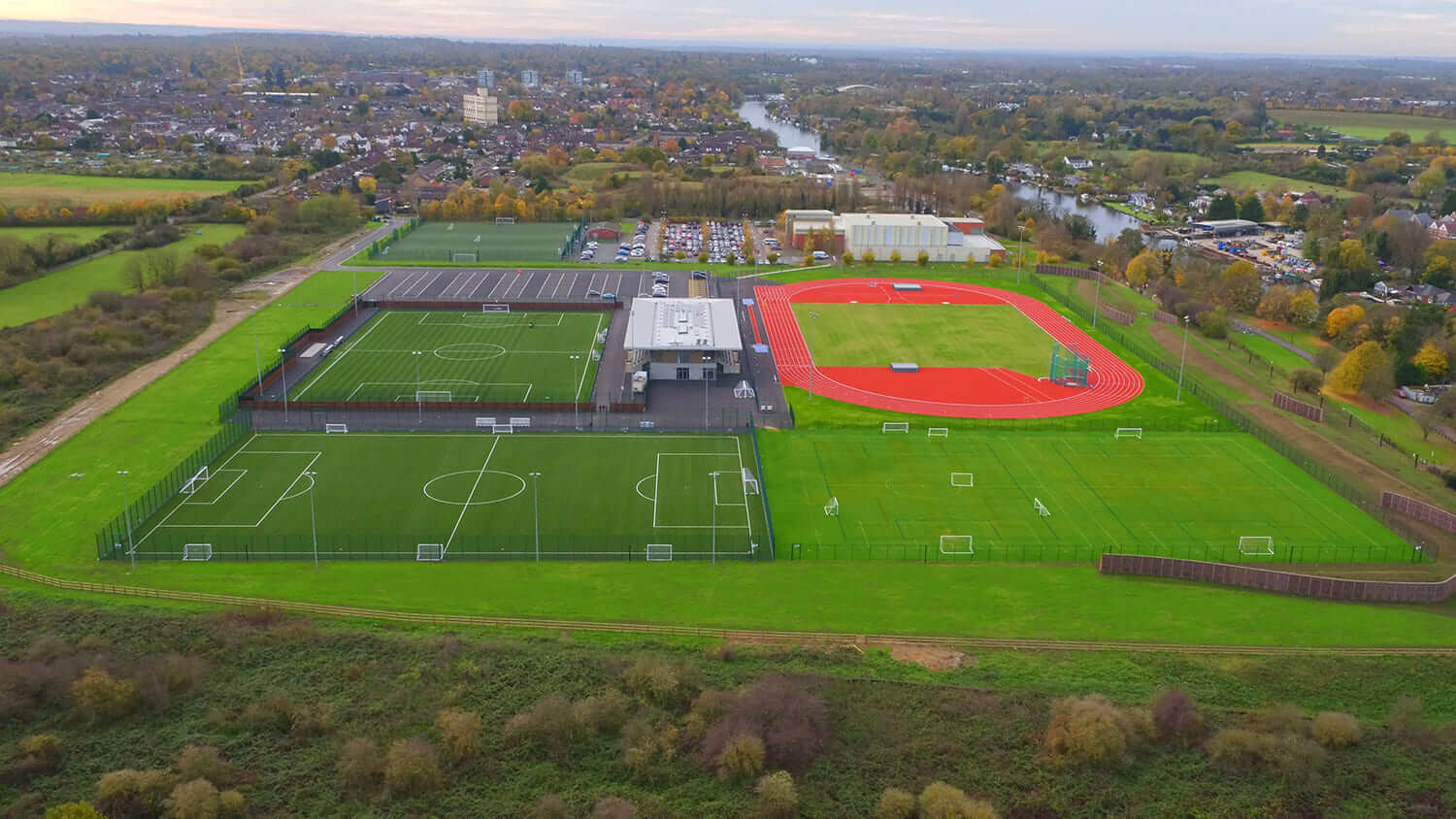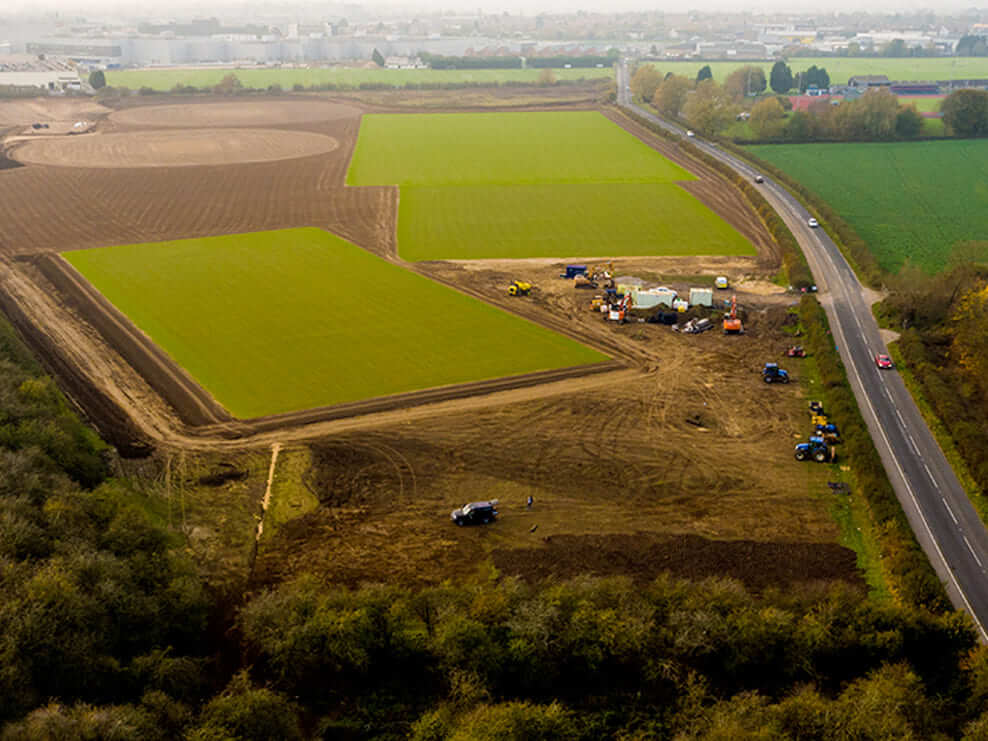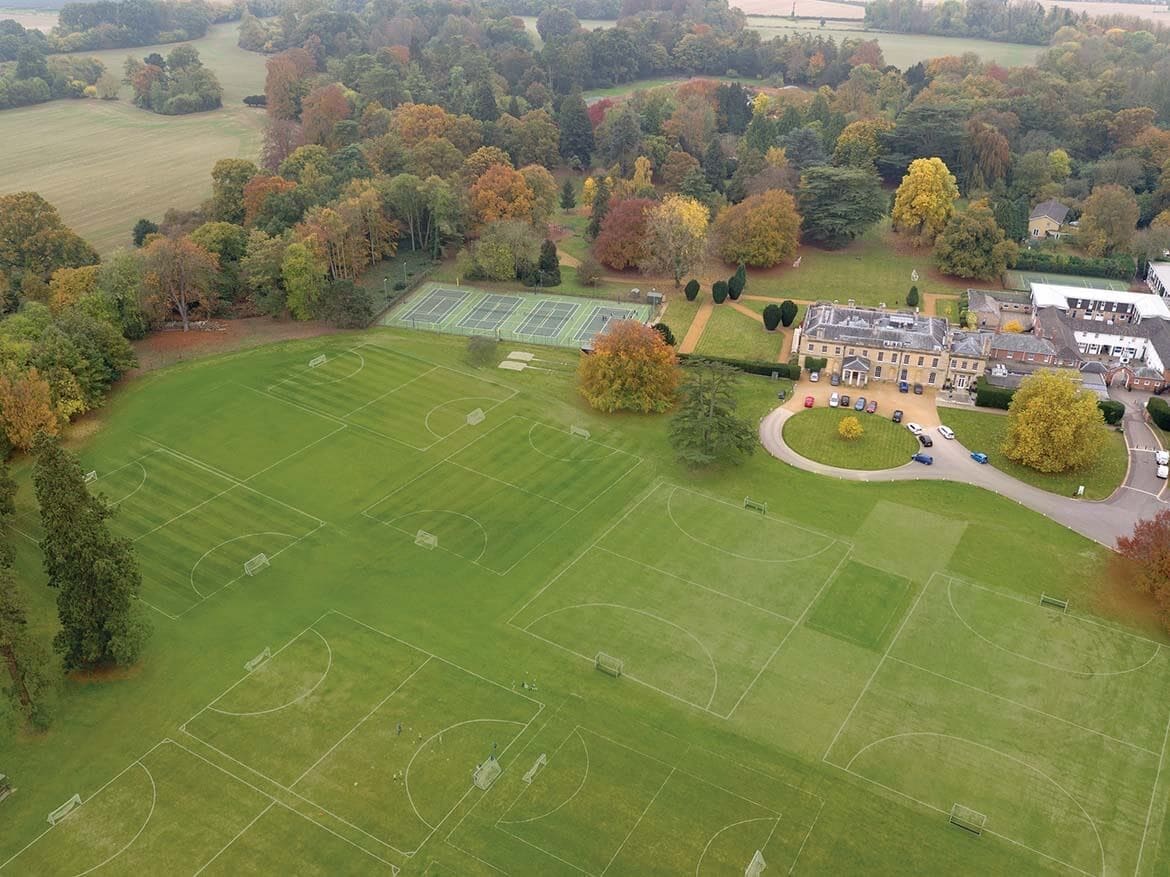S&C Slatter have a long history of delivering natural turf sports pitches for the sports, leisure, and education sectors.
With the acquisition of White Horse Contractors in 2019, we work closely with our sister company, utilising their 60+ years’ heritage as leading natural and hybrid turf sports contractors.
Read on to learn more about natural grass pitches or get in touch with our team to discuss your project needs.
Across S&C Slatter and White Horse Contractors, we have a combined 90+ years’ expertise in sports facility design, construction and maintenance.
We’re proud to offer a one-stop-shop for all elements of project delivery, from design and planning to finance, construction and maintenance to ancillary works.
With unmatched in-house expertise across our group, we design and construct natural turf pitches for a variety of sports and specifications, from grassroots to elite level.
Call or email for an informal chat about your new natural turf pitch.

Natural grass training pitch – part of a mixed sports facility complex at Elmbridge Xcel Sports Hub, delivered by S&C Slatter
There are 10 key stages in the construction of a natural turf pitch, however these will vary depending on factors such as size, sport and location.
1. Design and planning
New sports pitches, change of use for existing pitches and even the addition of elements such as floodlighting will require planning permission.
Designs will be submitted as part of the planning phase and technical designs will be produced for the construction of the pitch.
2. Environmental considerations
This stage will factor in elements like the management of drainage and water run-off to mitigate the environmental impact of your new pitch.
3. Health and safety
Building a natural turf pitch requires a well-planned construction site that employs safety best practices that adhere to all legislative requirements.
4. Earthworks
As with all sports facilities, ensuring properly prepared foundations is crucial to the pitch’s performance, safety and durability.
5. Drainage
The type of drainage installed will depend on its location, budgetary requirements and the performance specification required for any relevant governing bodies.
6. Pitch profile
This is the stage where natural topsoil is introduced to the pitch, which can be supplemented with sand to improve its quality and drainage properties.
7. Secondary drainage
Depending on the specification of Sport England pitch required, secondary drainage can be installed before or after seeding. Our in-house designers can customise secondary drainage systems specifically to suit your site and the underlying ground conditions.
8. Natural grass
Custom seed blends and species can be designed to suit a specific environment and/or sport to create an optimum turf. Growing-in time is completely dependent on irrigation and prevailing whether and grounds team resources. Custom irrigation systems and maintenance can be introduced and managed by our in-house teams.
Pitches can be performance quality tested to BS/FIFA and other governing body standards as required.
9. Ancillary equipment
As well as equipment required for your specific sport(s) such as fencing, floodlighting and goalposts, this can include any project-specific requirements you have such as spectator stands, pavilions and car parks.
10. Renovations
Renovations should be carried out annually to maintain surface safety, quality and performance, while ensuring effective drainage. Renovation works include scarification, koroing, aeration, top dressing, over-seeding and fertilising.
Natural turf pitches are pitches constructed with a natural turf – grass – surface.
While the surface of the pitch is grass, there’s a lot of difference between a grass field and a grass sports pitch! Natural grass pitches, as with any other sports facility, require expert design, construction, and maintenance to ensure they are suitable and safe for sport.
The section above outlines the stages of sports pitch construction, and you can find out more about maintenance further down the page.
Natural turf sports pitches are traditionally used for sports such as rugby, football and cricket and are used at the very highest levels of each sport.

Natural grass pitches under construction at Horspath Sports Park

Farleigh School remodelled cricket outfield
A full-sized, natural grass sports pitch will cost £120,000 on average, however natural turf pitches can cost between £50,000 – £350,000 depending on the pitch specification, performance level and location.
Pitch renovation generally costs between £15,000 – £20,000 for a full-sized annual pitch renovation.
The main factors that will impact the overall pitch cost are:
Additional work is also often required in the form of ancillary equipment (team shelters, pavilions, spectator areas) and civil engineering (access pathways, hard standings, roadways and car parks), so this may need to be factored into your costs.
Please get in touch if you’d like an example of a detailed breakdown of project costs, or a quote on the cost of building a natural turf pitch for your needs.
Design and planning is usually the longest stage in any sports construction project.
A construction programme will be agreed with you once planning has been granted and the typical time on-site to construct a new natural turf pitch is between 6 – 8 weeks, weather dependent.
Growing-in time for a natural turf pitch is entirely dependent on irrigation, prevailing weather and the resources available to the grounds team, so the period of time between construction and play will vary.
Our team at White Horse Contractors will maintain the natural turf throughout the growing in period, providing agronomy support using our in-house expertise.
Although many schools and clubs fund the construction of their pitches through private funds/capital expenditure, there are funding options available for natural pitch construction.
In some cases this can be sport specific, with the RFU and RFL providing funding advice and options for Rugby facilities, ECB for cricket and organisations such as the Football Foundation for football.
While not every organisation is eligible for grant funding, there are alternative finance solutions available to eligible organisations, clubs and schools, such as hire purchase agreements and finance leases. Find out more on our funding page.
A properly constructed and well-maintained natural turf pitch can last for many years.
With natural turf, it’s particularly important to manage the amount of pitch usage and carry out annual renovations to ensure optimum performance, safety and longevity.
Depending on the pitch type and drainage system in place, the recommended number of hours of adult use per week according to Sport England is a maximum of 6. This varies from under 2 hours per week (undrained pitches) to 6 hours (pipe drained with suspended water table).
If you need a sports pitch that can handle more usage per week, you may wish to consider an artificial or hybrid turf pitch.
Natural turf pitches that pass the Performance Quality Standards (PQS) outlined by the FA, Rugby Union, Rugby League and ECB are suitable for all levels of match play and training.
PQS for each governing body include criteria for several elements such as grass height, thatch depth, water infiltration rate, PH Value and slope.
We’ll work with you to design and construct a natural turf pitch that meets the requirements of your chosen sport, governing body and level of performance – from grassroots and school sport all the way through to elite level sport.
Natural turf pitches require regular maintenance to ensure that they adhere to the Performance Quality Standards required, as well as to ensure maximum safety and lifespan.
Maintenance can include fertilisation, seeding, top dressing, aeration, vertidraining, overseeding and mowing.
To find out more about maintaining or renovating natural turf pitches please get in touch.
S&C Slatter and our sister company White Horse Contractors are specialists in the construction of natural, hybrid and artificial turf sports pitches.
With in-house design and planning, civil engineering and maintenance divisions, we offer a one-stop-shop service, providing one point of contact from initial concept through to completion.
For more information call 01635 34521 or email enquiries@slattersportsconstruction.com